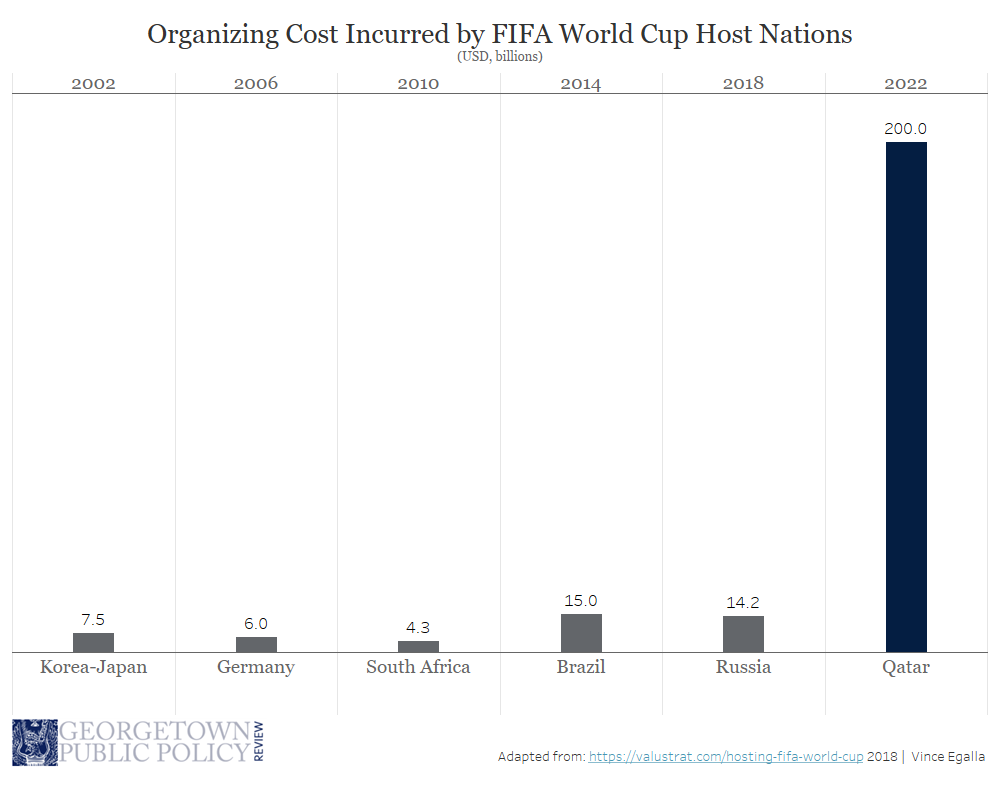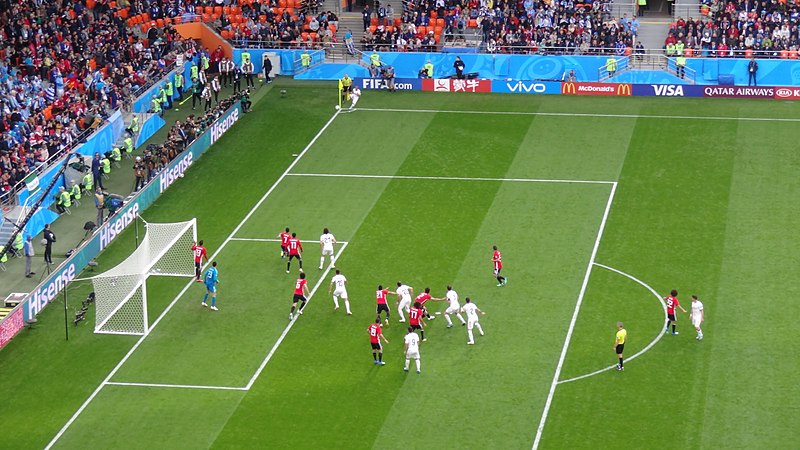The 2026 World Cup sanctioned by the Fédération International de Football Association (FIFA) will be hosted by the trio of Canada, Mexico, and the United States. This will be the highest-profile single-sport event with this kind of host structure, which presents potential political and logistical concerns. This article puts forth a case study for tournament organizers and highlights key components organizers should center on to maximize the local and international opportunities the world’s largest sporting event provides.
With more than half of the world population tuning in every four years, the FIFA World Cup is the pinnacle of football passion. In January 2017, to make the event even more exciting and broaden the tournament’s appeal, FIFA decided to expand the World Cup to 48 teams. Given the implications of this decision, the expansion will take effect from the 2026 FIFA World Cup.
However, there is another reason the 2026 FIFA World Cup will be unique. As announced on June 13, 2018, FIFA Congress members voted in favor of the United Bid submitted by the football federations of Mexico, U.S. and Canada—making 2026 the first FIFA World Cup to be co-hosted by three nations. Of the competition’s 80 football matches across 16 stadiums, Mexico and Canada will host 10 matches each, and the USA will host 60 matches.
Of the three host nations, both Mexico (in 1970 and 1986) and the U.S. (in 1994) have previous World Cup hosting experience. Although Canada is yet to host the men’s event, in 2015 Canada hosted the Women’s World Cup and has hosted multiple Olympic Games and most recently the 2010 Winter Olympics in Vancouver.
About the Bid Book
The Bid Book is generally considered to be a preface to the actual event planning. According to the Bid Book, the 2026 FIFA World Cup will generate record revenues and opportunities to benefit not only the hosts but also the global football community
The North Americans pledged their tournament would generate an $11 billion profit for FIFA – greater than any previous World Cup finals… The “United Bid” projected that its tournament would generate more than $5 billion in short-term economic activity, including the creation of 40,000 jobs and more than $1 billion in incremental worker earnings. More than 5.8 million tickets are expected to be sold, generating over $2 billion in ticketing revenue.
Evans and Philips (Reuters)
FIFA rules require certain capacity standards to host matches:
- The opening match and final match venues must hold 80,000 spectators
- Semi-final match venues must hold 60,000 spectators
- Group stage matches, the round of 16, quarter-finals and the third-place match venues must hold 40,000 spectators
In addition, the hosts promise over 150 venue-specific training sites and practice facilities with modern training amenities. The bid also has sustainability promises, all the stadiums will still be of use after the tournament.
Learning from the past
Hugely popular mega sporting events (MSEs), including the FIFA World Cup, are associated with ever-increasing costs to meet competition standards, with the estimated hosting costs for the next World Cup approaching $200 billion.

Therefore, future organizers should review the experiences of the past MSE hosts for important lessons and opportunities. The strategies implemented, outcomes achieved and challenges faced by the past hosts can help shape the strategic planning for future events.
Although Mexico, U.S. and Canada have a wealth of experience, expertise and capacity to host a successful tournament, the 2026 FIFA World Cup will be among the first experiments of three co-hosting nations. Despite many benefits of co-hosting an MSE, it comes with certain unique challenges with the most critical one being the need to align the capacities and logistics of host nations and managing the international and subnational interdependencies.
The three-host concept has been tried in other sports: in 2011, India, Pakistan and Sri Lanka co-hosted the ICC Cricket World Cup; and in 2023, Japan, Indonesia, and the Philippines will co-host the FIBA Basketball World Cup. In regional FIFA football competitions, multiple hosts are more frequent: in 2012, Equatorial Guinea and Gabon hosted the Africa Cup of Nations; in 2000, 2008, and 2012, two countries co-hosted the Euro competitions; in 2019, the U.S., Mexico, and Costa Rica co-hosted the Gold Cup; and in 2007, the Asian Cup had four host countries (Indonesia, Malaysia, Thailand, and Vietnam).
But for the largest competition in the world, only one contest has had multiple hosts: Japan and South Korea co-hosted the FIFA World Cup in 2002. Their experience could serve as a benchmark to evaluate unique challenges that might arise during the 2026 FIFA World Cup.
During the 2002 FIFA World Cup, co-hosts argued over a number of issues, including the official name order, ticket price policies and visa issuing as well as currency exchange and stadia construction, which contributed to the complexity of co-hosting a mega event.
Similarly, any political spat between the U.S., Mexico and Canada could cause border tensions restricting the free movement of spectators. Political conflicts could complicate visa approvals for international travelers across the three nations.
Travel logistics between host countries can be another challenge for spectators, which was clearly evident during the 2002 FIFA World Cup. Although the 2026 FIFA World Cup would not require spectators to cross a sea, traveling distant miles can be challenging. Travelers will also need to manage three different currencies. Given the proliferation of distributed ledger technology, financial technology and banking innovation, this could be an opportunity to promote a cashless FIFA World Cup.
At the 2010 FIFA World Cup in South Africa, ticket counters were placed in shopping malls and city centers to encourage local business opportunities and to make tickets accessible to people from diverse economic backgrounds. Similarly, implementing ticket sales through online and offline channels may help ensure greater participation during the 2026 FIFA World Cup matches.
The United Bid Book refers to various entertainment programs and festivals to be conducted to engage fans during the event. Host nations should consider expanding these entertainment programs and festivals to take place before, during and after the tournament as well as in non-host cities to ensure longer visitor stay even after the final match (as seen during the 2018 FIFA World Cup in Russia). Qatar, the host of the 2022 FIFA World Cup, has similar plans to increase tourism and local business opportunities. A similar strategy, if adopted during the 2026 FIFA World Cup, would help increase the scope for local businesses in host and non-host cities.
Extending local business hours during event days would maximize economic activity – a serious challenge faced during the 2014 FIFA World Cup in Brazil. Since the 2026 FIFA World Cup will be co-hosted by three nations, the Local Organizing Committee and tourism agencies should cooperate to offer three-nation packages for international travelers and maximize the impact of the tournament on the local tourism industry.
The FIFA World Cup provides a global platform that can enhance or rebrand a nation’s image as well as help spread awareness about a particular cause across the world. Past tournaments have been used as a platform to promote environmental causes. Restricting the use of non-recyclable materials, enhancing waste management and recycling, as well as the use of electric vehicles, are good examples adopted during the 2014 FIFA World Cup in Brazil and the 2018 FIFA World Cup in Russia that helped reduce their carbon footprint. While adopting similar measures, the 2026 FIFA World Cup organizers could go even further by innovating carbon-neutral transportation between the three nations.
With a variety of opportunities and challenges ahead, the 2026 FIFA World Cup could serve as a major catalyst for innovation and business opportunities. However, taking advantage of those opportunities will depend on the collaboration between the policymakers, organizers and local businesses, and determine the impact and legacy of the 2026 FIFA World Cup.
Photo by Soul Train.
Rauf Mammadov’s professional background includes a mix of developmental banking and public policy as well as strategy consulting and planning for the 2022 FIFA World Cup. In addition to his current role as the Advisor to CEO at Qatar Development Bank, Rauf is pursuing DBA at IE Business School where his research focuses on the impact of MSEs on local entrepreneurship.
